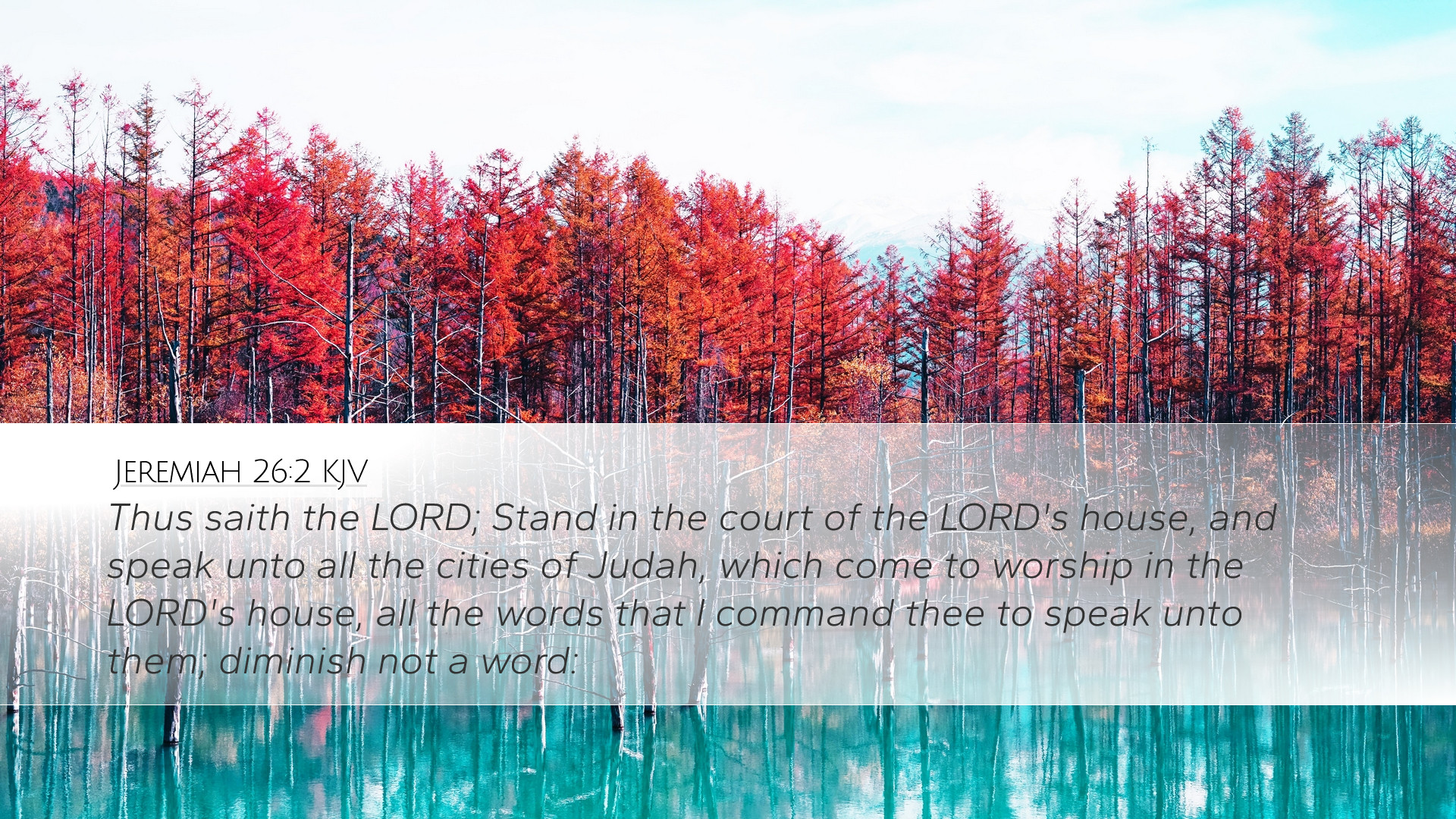Commentary on Jeremiah 26:2
Verse Context: Jeremiah 26:2 states, "Thus saith the Lord; Stand in the court of the Lord’s house, and speak unto all the cities of Judah, which come to worship in the Lord’s house; all the words that I command thee to speak unto them; diminish not a word." This verse is pivotal as it reflects God's command to the prophet Jeremiah to deliver His message faithfully to the people.
Introduction
This verse encapsulates the prophetic task entrusted to Jeremiah, indicating both the authority of his message and the seriousness with which he must deliver it. In understanding this verse, we gain insight into the role of the prophet, the nature of divine communication, and the responsibilities that come with proclaiming God's word.
Insights from Matthew Henry
Authority of the Command: Matthew Henry emphasizes that the Lord Himself instructs Jeremiah. The direct command to "stand in the court" signifies the public nature of Jeremiah's ministry. His role was not merely private but aimed at a collective audience.
The Importance of Truth: Henry articulates that the charge to "diminish not a word" underscores the necessity for complete fidelity to God's message. A prophet must deliver the entirety of God’s counsel without alteration, highlighting the weightiness of God’s words.
Accessibility of the Message: The court of the temple was a central place where worshippers gathered. This setting signifies the accessibility of divine truth to the people, reinforcing that God's message is meant for all, not just a select few.
Insights from Albert Barnes
Call to Action: Albert Barnes notes that this verse illustrates God’s initiative to reach out to His people. The phrase “speak unto all the cities of Judah” indicates an urgent call to repentance and warning against impending judgment.
God’s Desire for Communication: Barnes stresses that God's desire is for His people to hear and heed His words. The emphasis on public proclamation reflects God's willingness to engage with His creation actively.
- Public Responsibility: The Jewish leaders and people had a communal responsibility to listen and respond to Jeremiah's prophetic words.
- Consequences of Noncompliance: Barnes warns that failing to heed this divine caution could lead to severe consequences for the nation of Judah.
Insights from Adam Clarke
Prophetic Representation: Adam Clarke elaborates on Jeremiah's role as a mouthpiece for God. The phrase “all the words that I command thee” signifies the divine authorship of the message, asserting that it is God’s truth being communicated through Jeremiah.
Call for Repentance: Clarke interprets this command as a beckoning for the people of Judah to turn from their wicked ways. The urgency in the tone suggests that time is of the essence, reinforcing the need for immediate action in response to God’s calling.
Historical and Cultural Context: Clarke emphasizes the historical setting of this call, noting that the temple in Jerusalem was the focal point of Jewish worship and national identity. This context is critical as it shapes the reception and understanding of Jeremiah's message by the audience.
Thematic Reflections
This biblical verse touches upon several key themes that are crucial for pastors, students, and scholars:
- Prophecy and Its Importance: Understanding the role of prophecy in the Old Testament and its implications for faith communities.
- The Nature of God's Communication: Exploring how God communicates with humanity and the expected human response to His beckoning.
- Community Responsiveness: The necessity for communal engagement in faith and the responsibility of leaders to uphold the truth.
Practical Application
This verse holds significant implications for preaching and teaching today. Pastors and church leaders are called to proclaim God’s message faithfully, ensuring completeness and authenticity.
Encouragement for Faithfulness: The directive to not "diminish a word" encourages present-day ministers to embrace the fullness of Scripture, allowing God's Word to transform hearts and lives.
Call for Outreach: Like Jeremiah, today’s church is called to stand in public forums and proclaim the gospel, urging individuals and communities towards repentance and faith.
Conclusion
Jeremiah 26:2 stands as a profound reminder of the responsibility that comes with being a messenger of God's truth. The rich insights drawn from the commentaries of Matthew Henry, Albert Barnes, and Adam Clarke provide a solid foundation for understanding the weight of this verse. For pastors, students, and theologians alike, the call to proclaim the unfettered truth of God's Word resounds with urgency and importance.


